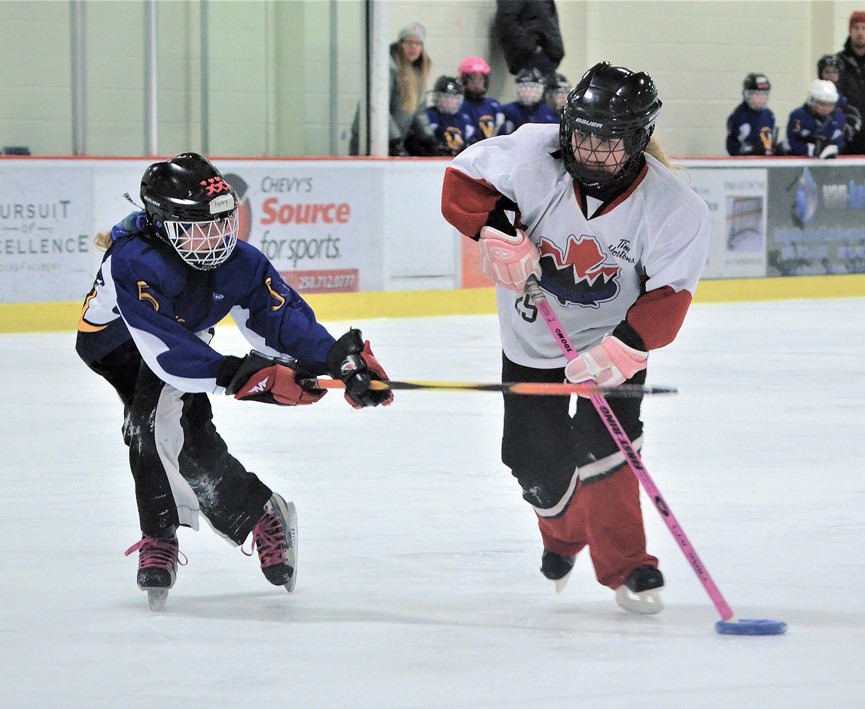Some call it the fastest game on ice – but ringette is also an inclusive game, and gentler than many other team sports, according to Rose Vlaar, president of the North West Vancouver Ringette Association.
Vlaar has two daughters in ringette and she believes the inclusiveness of the sport keeps them on the ice. The game has many similarities to hockey, but instead of a puck and L-shaped stick, the players play with a rubber ring which they move using a straight stick.
“The rules require more team playing, more passing,” Vlaar explained. “That helps facilitate more inclusion.”
That is something her girls like about ringette.
“They really do appreciate the requirement of the game to be team-oriented,” Vlaar said.
Ringette was invented in 1963 by Sam Jacks, who worked for parks and recreation in North Bay, Ont. He wanted to create a sport on ice for girls, but later it was transformed into a co-ed sport. (Jacks had also invented floor hockey in the 1930s.)
Gender is not an issue in ringette, Vlaar said, and she believes it attracts boys who don’t like the physical contact prevalent in hockey. No intentional body contact is allowed in ringette.
The rules were developed to make the play move along quickly, using the 30-second rule: teams can have possession of the ring for only half a minute before they have to shoot on goal or they lose possession of the ring – this is timed by the shot clock. Games have two periods of 15 to 20 minutes each, depending on the age of the players, and there are only three players allowed at any one time in the offensive or defensive zone.
Vlaar’s younger daughter could barely skate when she started ringette, but this was not an obstacle because of her young age. When she first strapped on a pair of skates to play ringette, she was wearing full protective gear and the fear of falling dissipated.
“As soon as she had a stick in her hand, she didn’t worry about her feet,” Vlaar explained.
Younger players don’t necessarily need to know how to skate as they learn fairly quickly on the ice, Vlaar explained, but older kids who might want to play but can’t skate are encouraged to take some skating lessons in advance of playing ringette.
Vlaar’s daughters are 14 and 11 and have been playing ringette for four years.
“They love it – they live for it,” Vlaar said. Friendships are a large part of ringette, chatting and bonding in the changing rooms and on the road while attending tournaments.
Vlaar has also made friendships with other ringette parents as they take their kids to practices, games and tournaments.
Her younger daughter will be hitting the ice this week despite the heat and smoke-filled skies – she is scheduled to go to a ringette camp in Vernon, put on by the National Ringette School.
This year, Vlaar’s older daughter will be training to be a referee and a junior coach, something she can use towards her high-school volunteer hours.
Last season, North West Vancouver Ringette Association had 110 under-18 players registered. They’re anticipating growth of 15 to 20 per cent this year.
Players can join mid-season, Vlaar said, noting that, for example, they had four players join in January last season.
The younger players, aged four to nine, practise at the Canlan arena, and the older ones, aged 10 to 18, practise at the Karen Magnussen Arena.
Some teams also play at the West Vancouver Arena. Teams practise either once or twice a week and there is usually a game every weekend. Each team also tries to get to two or three tournaments per year.
In the 2016/17 ringette year, there were 30,717 players across Canada.
Children aged five to 14 interested in learning how to play ringette can come to one of three free events in September.
Participants are asked to wear a coat and gloves, but helmets and skates will be provided. They should arrive about 15 minutes early to put on the equipment. To register, go to cometryringette.ca.
Those interested can try the sport on Sept. 8, 10:15 a.m.-12:15 p.m. at Karen Magnussen Community Centre, Sept. 15, 4:30-6:30 p.m. at West Vancouver Ice Arena or Sept. 22, 10:15 a.m.-12:15 p.m. at Karen Magnussen.



